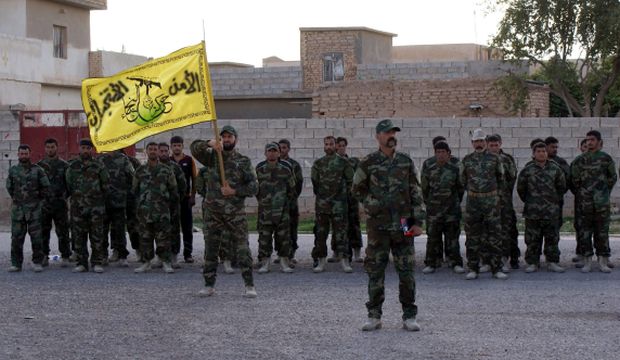
A picture made available on March 5, 2015 shows members of the Iraqi Shi’ite militia Kata’ib Hezbollah taking part in a training course at a military base in Jallam town, near Samarra, northern Iraq, on March 4, 2015. (EPA/Baraa Kanaan)
Baghdad, Asharq Al-Awsat—Washington and Tehran have reached a “special understanding” over the forthcoming offensive against the Islamic State of Iraq and Syria (ISIS) in Tikrit, Iraqi political sources said, as the US warned the assault to retake the city must not fuel sectarian tensions.
The latest developments in the ongoing fight against ISIS in Iraq come as the US-led international coalition continued to carry out airstrikes against ISIS-held positions in central and western Iraq, but did not assist in the latest offensive against ISIS positions in the Sunni-dominated Salah Al-Din governorate.
Anti-ISIS Sunni tribal forces are also continuing to fight ahead of a move to unify their ranks as part of initiatives to form a new Iraqi National Guard force. Meanwhile, Iraq’s Shi’ite militias, including some directly backed by Tehran, have already unified to form the Popular Mobilization force, which has also been allocated funds in the Iraqi state budget.
A senior Iraq political source, speaking to Asharq Al-Awsat on condition of anonymity, said: “Iran wanted to take part in the battle for Salah Al-Din and that is part of the special understanding that Tehran has reached with the Americans, with the knowledge of Baghdad, which included not requiring US aerial contribution [to the battle], even though there was a technical need for this.”
The source acknowledged that Iranian military figures like Gen. Qassem Suleimani are involved on the Iranian side, but stressed that this was “not consistent with US participation at this stage.”
“Iran will not have a presence in the battle for Nineveh and Anbar for a number of important reasons . . . The [Shi’ite Popular Mobilization] forces cannot and will not succeed in coordinating with the majority Sunni–Kurdish forces in Mosul, or the wholly Sunni population in Anbar,” he added.
Speaking on Wednesday, White House spokesman Josh Earnest warned that any offensive to retake control of the city of Iraqi must not fuel sectarian tensions between Iraq’s Sunni and Shi’ite communities.
“It is important, and Iraqi Prime Minister Haider Al-Abadi himself has indicated . . . that this operation should not be used as an excuse or as cover for individuals taking sectarian-motivated retribution,” he said.
“That would tear at the fabric of the country, and weaken the ability of the Iraqis to confront this threat to their country,” he added.
The White House spokesman acknowledged that Iranian forces are involved in the latest anti-ISIS operations but refused to divulge further details, confirming only that there is no direct coordination between Iranian and US forces.
“Iranian forces are involved. We have said from the beginning that the United States will not coordinate militarily with the Iranians,” he said.
“The fact that some Iranian military personnel are involved doesn’t change the priority that the Iraqis can and should place on this operation to ensure that it’s inclusive and multi-sectarian,” Earnest added.
However, an Iraqi field commander who is participating in the battle against ISIS in Salah Al-Din province, speaking to Asharq Al-Awsat on condition of anonymity, complained of a lack of coordination and cooperation between Iraq’s Sunni and Shi’ite forces.
“Coordination so far has not reached the required level, particularly as there was a move from day one to allow one force to play a much more prominent role at the expense of another,” the Iraqi commander said, implicitly referring to the Popular Mobilization force.
Iraq’s Popular Mobilization force is led by the Iranian-backed Badr Organization leader Hadi Al-Ameri and is playing a significant role in the anti-ISIS offensive in Salah Al-Din, with some military commanders complaining that the Shi’ite-led force has sidelined Iraq’s military. Iraq’s Sunni-led forces are also wary of the prominent role being played by the Popular Mobilization force, prompting the White House’s comments on Wednesday to ensure that the joint anti-ISIS operation does not fuel further sectarian tensions.
